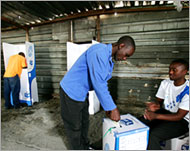ANC leads in South Africa local polls
South Africa’s ruling African National Congress has taken an early lead as results from local government elections trickle in but voter turnout – viewed as a gauge of voter sentiment – is low.

Analysts said early results on Thursday showed voters angry with the ANC over a lack of basic government services did not shift their support to opposition candidates but expressed their dissatisfaction by staying away from the polls.
Voters on Wednesday cast ballots for government leaders in 277 municipalities and the country’s six major cities.
The domestic news agency SAPA said provisional statistics showed the ANC had received 7.66 million of the votes counted so far, followed by the official opposition Democratic Alliance with 1.9 million.
Led by Thabo Mbeki, the president, ANC officials had fanned out across the country to drum up support and boost turnout over the 48% seen in the last local government elections in 2000.
ANC test
By 0845 GMT, 82% of all votes cast had been captured and audited, Brigalia Bam, the International Electoral Commission head, said, putting voter turnout at 47.1%.
Bam said she expected 90% of the result to come in by Thursday evening.
Asked about the turnout, Kgalema Motlanthe, ANC secretary-general, told public broadcaster SABC: “We could have done better.”
 |
|
Voters are unhappy with lack |
Analysts say any drop in support for the ANC at the polls could be a sign that the party’s hold over voter loyalty, earned during the long struggle against white rule, was no longer as solid as it once was.
Susan Booysen, a political analyst at Johannesburg’s University of the Witwatersrand, said: “We are not at a point where dissatisfaction translates into votes for the opposition.
“But the ANC is under pressure to do things better and improve things quicker, or suffer the consequences.”
South Africa’s opposition remains locked in narrow niches that appeal mostly to specific racial or regional interests.
Results from the ballot for some 45,000 local councillors across the country were trickling in, but officials said it could take until Sunday for the final vote tally to be made.
Cape battle
Cape Town was a tight race as the ANC faced a challenge from the opposition Democratic Alliance, which has stepped up criticism of the ruling party after almost two weeks of power cuts all but paralysed South Africa’s main tourism centre.
The ANC was also facing an unexpectedly tight challenge for the control of the capital Pretoria, where analysts said residents opposed to plans to change the city’s name to Tshwane had come out in numbers to vote for the opposition.
 |
|
In Khutsong, angry residents |
Officials were pleased with the conduct of Wednesday’s vote, which was largely smooth despite fears of unrest in areas which had seen violent rioting in recent months over lack of basic services and perceptions of government inaction.
In the township of Khutsong 70km southwest of Johannesburg, tyres burned in the streets and voting stations lay empty as residents boycotted the poll.
This was to protest moves to change district boundaries to move the community into a poorer province, which many fear will mean even worse government services.
Mary Martins-Engelbrecht, police spokeswoman, said police fired rubber bullets after coming under attack in Khutsong from one group of demonstrators and later made 18 arrests.
She added that for the most part the day was peaceful.